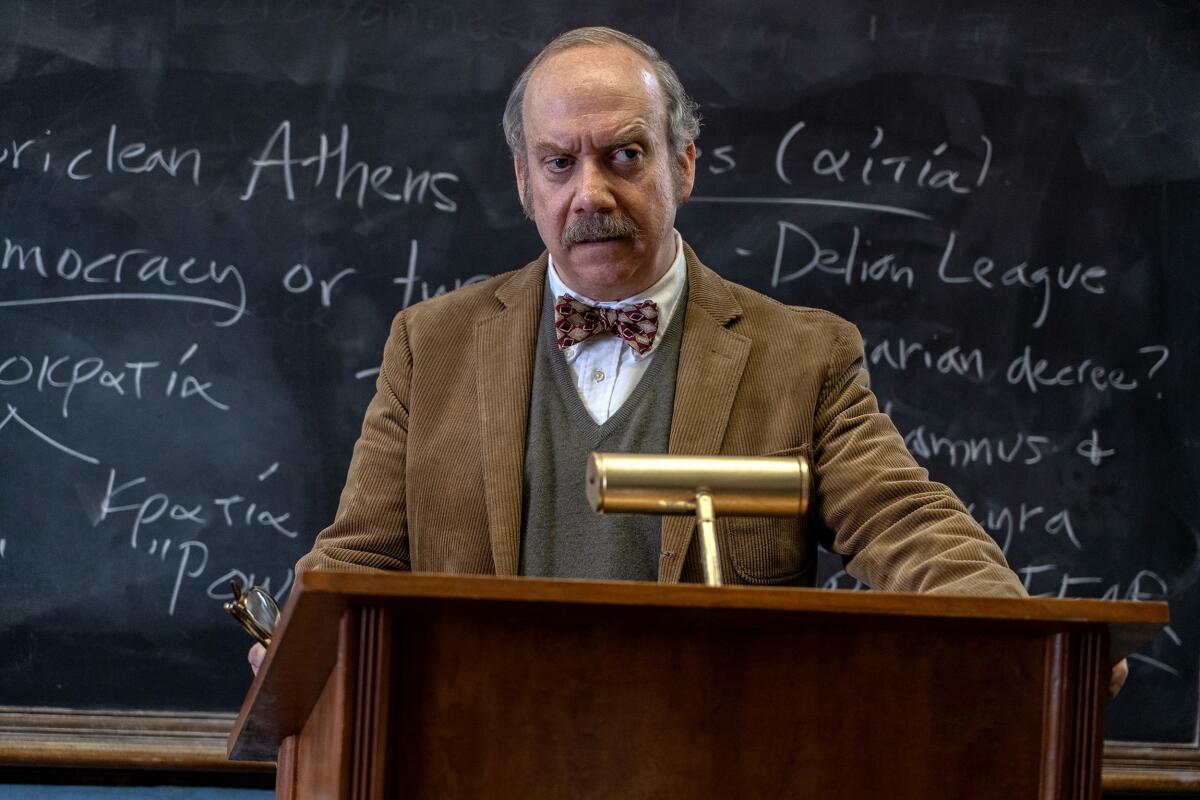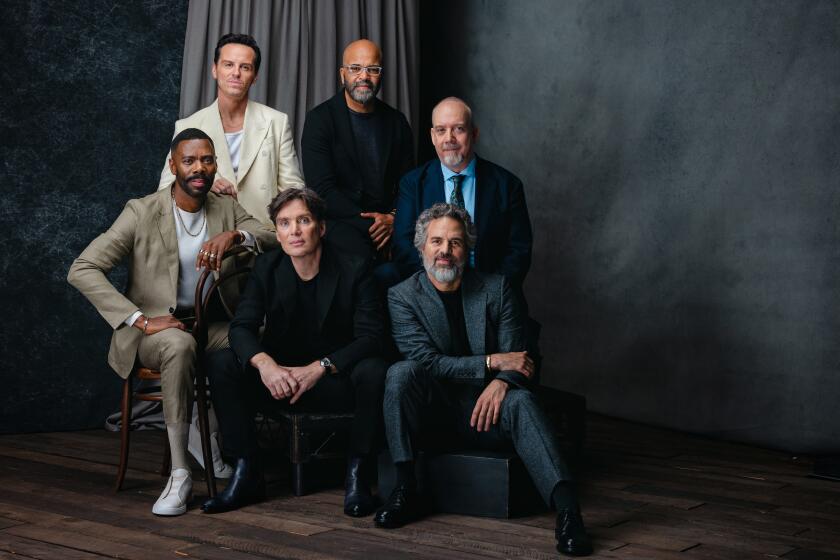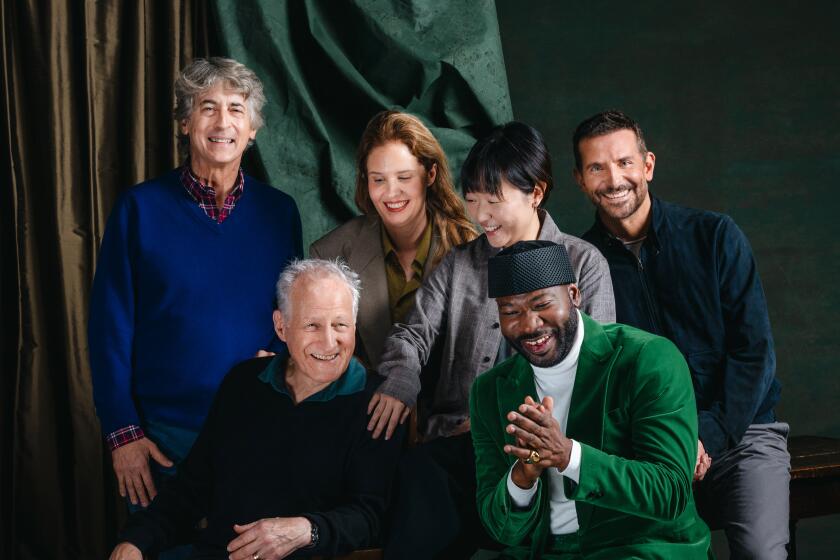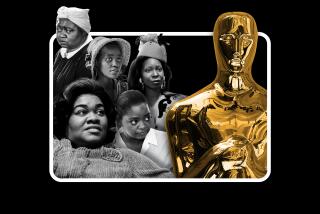Paul Giamatti knows his ‘Holdovers’ character is mean. But he’s also kind of funny

Twenty years after fulminating under the Napa Valley sun as a dyspeptic wine snob in Alexander Payne’s “Sideways,” Paul Giamatti is back with the filmmaker for “The Holdovers,” this time in the unforgiving Massachusetts winter of 1970. “Everybody’s had a Mr. Hunham type,” says Giamatti of his haughty, dismissive character, an irritable prep school teacher trapped on campus over Christmas break. “I had a biology teacher very much like this guy.” The actor’s familiarity with East Coast academia extends beyond just attending schools like the film’s: His dad was a professor. “My father wasn’t like [Hunham], but there were colleagues of my father who were so pleased by their own wit and intelligence, when nobody knows what they’re talking about. That oblivion is funny to me.”
At the beginning, Mr. Hunham isn’t all Scrooge, is he?
He’s not a bad guy. I don’t think he’s wrong in a lot of what he says right off the bat to the headmaster. He tells that racist little jerk to shut up. Alexander Payne makes a great distinction between nice and kind. And this guy, he may not be nice, but underneath, he’s kind.
On the 2023 Envelope Actors Roundtable, Colman Domingo, Paul Giamatti, Cillian Murphy, Mark Ruffalo, Andrew Scott and Jeffrey Wright exchange views on AI, work that changed their lives and looking like other actors.
But he does relish the meanness he wields in the classroom.
I do think he takes pleasure in being an ass—. He’s presenting as one of those British schoolmaster guys, he’s playing up to that type. They’re performing for you a little bit. That’s what he likes about it. That pedagogy where you convey ideas through a kind of harsh cruelty. But my biggest concern was that it be clear he wasn’t such a bad guy from the get-go. I’ve had to play a lot of unpleasant people like this, and sometimes I feel like I hit it too hard. And I wanted to make sure, because it was important for the tone of this Christmas movie, being about empathy, that as much as the guy’s off-putting you’re on board with it.
We are, because you make Hunham’s antagonism funny. When he’s popping off insults to students, I imagine he thinks his favorite historical figures are laughing with him in spirit.
That’s exactly what I hoped to convey, the great wits of classical history gathered around, and he’s in that lineage. Those are his friends; they’re who is living and vibrant to him. He lives in the wrong century. Profoundly.

Outside of what the script gives you, what do you get inspired to add in any given scene?
Everything is sort of there. It’s so well written I don’t know what I bring to it other than what I’m getting from the script. I don’t know, whistling “Ride of the Valkyries” when I’m handing their papers back? That just happened. He thinks he’s whistling a jaunty tune, but it’s Wagner. That was something I thought of, I guess. Alexander asked, “What do you want in [his study]?” I said, I think this guy’s vice is mystery novels. You don’t see them, but they’re all over the place. Crappy paperback mysteries are his porn. Those things can give you a ton of energy and imagination.
That hilarious insert of Hunham encountering a football and confidently flinging it with no skill whatsoever is like a gag from the silent era. Was that scripted?
It was. I enjoyed that. Again, it’s a fantasy, being like Cicero on his morning constitutional around the Forum or whatever. Alexander Payne is a big silent comedy guy. He’s always telling me to watch Harold Lloyd. We had to shoot it a bunch of times, because Alexander kept telling me I was throwing it too well. Then finally, I thought, in his mind, it was a shot put, like out of the Romans.
Directors Blitz Bazawule (‘The Color Purple’), Bradley Cooper (‘Maestro’), Michael Mann (‘Ferrari’), Alexander Payne (‘The Holdovers’), Celine Song (‘Past Lives’) and Justine Triet (‘Anatomy of a Fall’) on how they do what they do.
Hunham’s self-importance is wonderfully undercut by Da’Vine Joy Randolph’s character, Mary, the school’s head cook.
She sees through all that, yes, and it makes that stuff much more fun to do. Mary is more open to me. She recognizes what a catastrophe I am, but I’m not a bad guy. There’s already a rapport with them that is very cool and subtle. We talked about that, the fact that she [thinks], “You’re probably the only person who knows my name.” What I love about Alexander’s movies is those details go by really fast, and you won’t necessarily pick up on it.
It’s more believable that these characters get somewhere affecting but not radical. Hunham learns to care about two people, not everyone.
And it facilitates some sort of freeing of himself, because I think he’s a guy who wanted to be free without even really knowing he wanted to be or knowing how to be. That’s also Alexander. It’s not some huge transformation suddenly. It’s incremental change. With any of them, you don’t know what’s really going to happen.
More to Read
From the Oscars to the Emmys.
Get the Envelope newsletter for exclusive awards season coverage, behind-the-scenes stories from the Envelope podcast and columnist Glenn Whipp’s must-read analysis.
You may occasionally receive promotional content from the Los Angeles Times.









